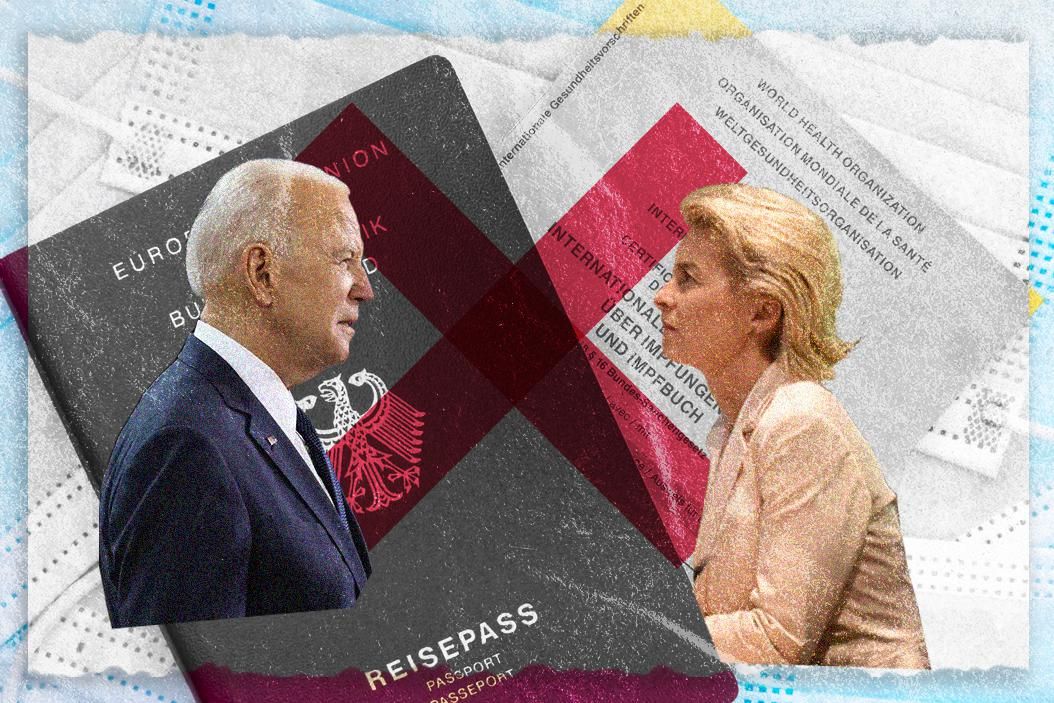September 01, 2021
"Many European diplomats are already infatuated with Biden," a US-based analyst wrote in May about the so-called revival of the transatlantic relationship. Well, that assessment seems to have aged as well as an overripe banana.
This week, the EU advised member states to restrict travel from the US because of America's rising COVID infection rate. While that may be true, it could also be, at least in part, a retaliatory move: Brussels is furious that the Biden administration has refused to allow most Europeans to enter the country for 18 months, despite the bloc now having vaccinated more adults than the US.
Indeed, this tiff between Brussels and Washington is just the latest development amid ebbing relations between the two.
A leader the world respects? Since moving into the White House, Biden has portrayed himself as the anti-Trump: reliable, sincere and a loyal ally. Where his predecessor made a habit of berating and belittling allies, Biden has said "we need a leader the world respects," vowing to bolster bruised relations, particularly in Europe.
Yet, while Biden talks a nice game, many of his policies over the past seven months have in fact further irked some European allies, who say that the US president's "foreign policy for the middle class" — focused primarily on domestic issues like infrastructure and containing COVID — does not feel materially different from Trump's "America First" approach.
This was certainly the dominant view in big European capitals in recent weeks, as the US embarked on a go-it-alone approach in Afghanistan. Allies with skin in the game complained of being left in the lurch as the US pursued a unilateral evacuation plan. Germany and the UK, two of the biggest contributors to the NATO mission there, were particularly incensed, with the UK parliament issuing what some called an "unprecedented rebuke" of a US president.
What's Biden's game plan? Biden's short-term agenda is domestically focused, and one that he hopes will help the Democrats win midterm elections next year and keep control of the US Congress. Ending "forever wars," a view popular with US voters, is part of that agenda.
But in failing to consult with allies on how and when to pull out, Biden took a big gamble because now he needs his European partners to make progress on other key issues like climate change, data sharing, and China. (To date, Biden has found little support in pushing back hard against China from the EU, which, broadly speaking, has pursued engagement with Beijing.)
Indeed, getting the Europeans on side might get tougher. For instance, it could be harder for the US to continue dragging its feet on climate change if Germany goes greener under a left-leaning government after next month's election. Similarly, France's President Emmanuel Macron has long been pushing the EU to pursue a defense policy independent from the US, which is only going to be an easier sell after the Afghanistan debacle.
Are COVID restrictions the new steel tariffs? Like with the US-China rivalry, which devolved into tit-for-tat shenanigans, perhaps the EU is enforcing new COVID restrictions to get back at Washington. But Brussels is unlikely to do anything to really punish the Americans, because it needs the US — badly.
The US is the EU's largest trade and investment partner by a long shot, with more than 164,000 EU companies relying on exports to the US. The EU also depends on America's military might: "It would take decades for Europe to build up its conventional and nuclear military forces to compensate for what the United States and NATO currently contribute to the continent's security," Germany's defense minister said recently, pointing to the fact that the US accounts for 100 percent of NATO's missile defense capabilities, while much of Europe's own military hardware is in bad shape.
"Being likeable is not the same as being a good ally," Edward Luce writes in the Financial Times. Biden is certainly testing the limits of that approach. But will it backfire? Given the EU's reliance on the US, probably not.
More For You
America’s new National Security Strategy confirms what Europeans have feared for months: Washington now sees a strong, unified European Union as a problem to be solved, not an ally to be supported.
Most Popular
Sponsored posts
The power of sports
What's Good Wednesdays
What’s Good Wednesdays™, December 10, 2025
Walmart sponsored posts
Walmart's $350 billion commitment to American jobs
In this episode of Tools and Weapons, Microsoft Vice Chair and President Brad Smith sits down with Ed Policy, President and CEO of the Green Bay Packers, to discuss how purpose-driven leadership and innovation are shaping the future of one of the world’s most iconic sports franchises. Ed shares how technology and community-focused initiatives, from Titletown Tech to health and safety innovations on the field, are transforming not just the game of football, but the economy and culture of Green Bay itself. He explains how combining strategic vision with investment in local startups is keeping talent in the Midwest and creating opportunities that extend far beyond Lambeau Field.
Subscribe and find new episodes monthly, wherever you listen to podcasts.
Members of security forces stand guard outside a polliong station, a week late in a special election, after the local governing party kept voting closed on election day, amid accusations of sabotage and fraud, in a presidential race still too close to call as counting continues, in San Antonio de Flores, Honduras, December 7, 2025.
REUTERS/Leonel Estrada
More than a week after Hondurans cast their ballots in a presidential election, the country is still stuck in a potentially-dangerous post-election fog.
© 2025 GZERO Media. All Rights Reserved | A Eurasia Group media company.
